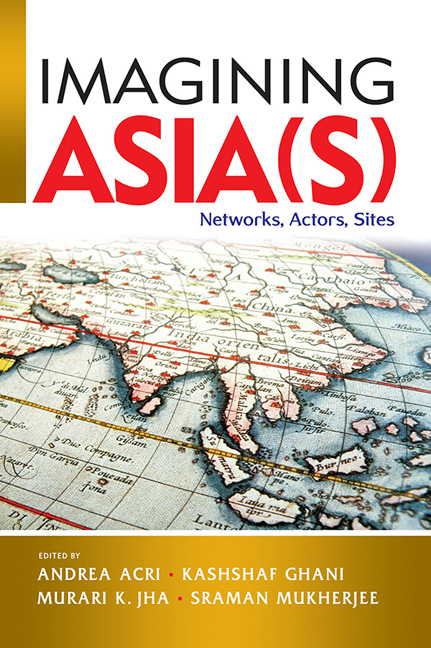Book contents
- Frontmatter
- Contents
- List of Contributors
- Introduction
- Part I Conceptualizing the Region: Past and Present
- 1 Locating Asia, Arresting Asia: Grappling with “The Epistemology that Kills”
- 2 Imagining “Maritime Asia”
- 3 In Search of an Asian Vision: The Asian Relations Conference of 1947
- Part II Conceptualizing Asia through the Prism of Europe
- Part III Networks of Knowledge Across the Indian Ocean
- Part IV Histories and Geographies of Pilgrimage in Asia
- Part V Trans-Local Dynamics and Intra-Asian Connections across Space and Time
- Index
3 - In Search of an Asian Vision: The Asian Relations Conference of 1947
from Part I - Conceptualizing the Region: Past and Present
Published online by Cambridge University Press: 31 January 2020
- Frontmatter
- Contents
- List of Contributors
- Introduction
- Part I Conceptualizing the Region: Past and Present
- 1 Locating Asia, Arresting Asia: Grappling with “The Epistemology that Kills”
- 2 Imagining “Maritime Asia”
- 3 In Search of an Asian Vision: The Asian Relations Conference of 1947
- Part II Conceptualizing Asia through the Prism of Europe
- Part III Networks of Knowledge Across the Indian Ocean
- Part IV Histories and Geographies of Pilgrimage in Asia
- Part V Trans-Local Dynamics and Intra-Asian Connections across Space and Time
- Index
Summary
In 1947, between 23 March and 2 April, New Delhi played host to the Asian Relations Conference over ten days. Studying the newspapers of the time allows us to capture the minutiae of this first attempt to articulate an idea of Asia. The newspapers, an underutilized source of research, help us capture in some detail, the sentiment of the moment, the various conversations that emerged at the time, their trajectory and allow us to ponder whether what followed was inevitable.
March 1947 was four and a half months before the Indian nation formally came into being. The months leading up to the conference had witnessed the bloodiest communal riots in the eastern regions of Bengal and Bihar and more recently in Lahore, Amritsar, and surrounding areas of Delhi. In fact, there was ongoing unrest in and around Delhi and the Punjab during the conference—news that featured on the front pages of daily newspapers. The India to which the delegates arrived, had learnt, a few weeks earlier from the British Government on 20 February 1947 its plan for India's future—stating that they intend to leave India by June 1948. This statement and its ramifications were still being discussed in political and social circles as well as in the press at the time of the conference. The statement had also announced that there would be a change in Viceroy to oversee the transition. At the time of hosting the conference, no one had a clue that Indian independence was going to be fast-tracked from June 1948 to August 1947, and that the country would be partitioned at birth. The light at the end of the tunnel of colonial rule was however visible and the country, led by Nehru, was working towards a future where India as a nation would have a global presence and establish independent relations with the other nations of the world.
Despite the volatile conditions and the acrimony characterizing Indian political life at that time, the Interim Government of India headed by Nehru went ahead with hosting the conference for which preparations had been underway for many months.
- Type
- Chapter
- Information
- Imagining Asia(s)Networks, Actors, Sites, pp. 60 - 90Publisher: ISEAS–Yusof Ishak InstitutePrint publication year: 2019

